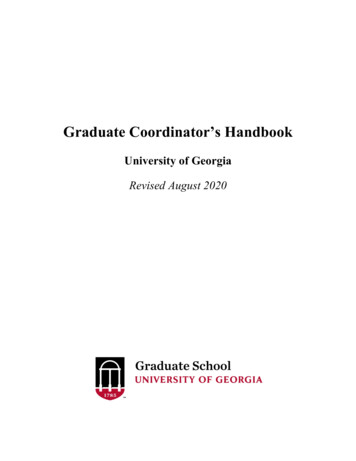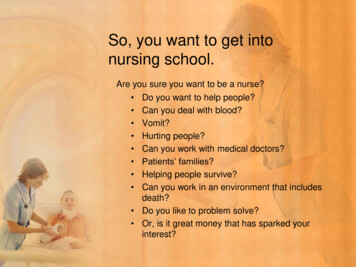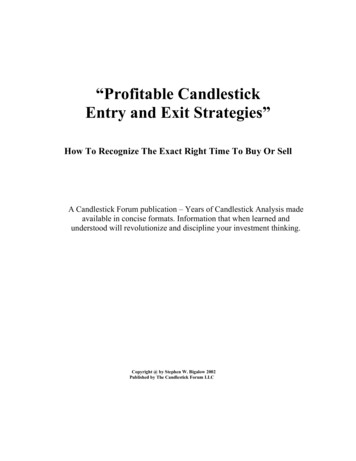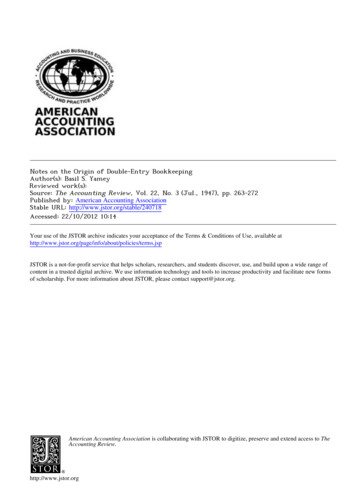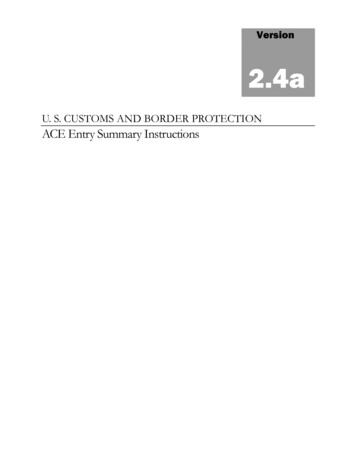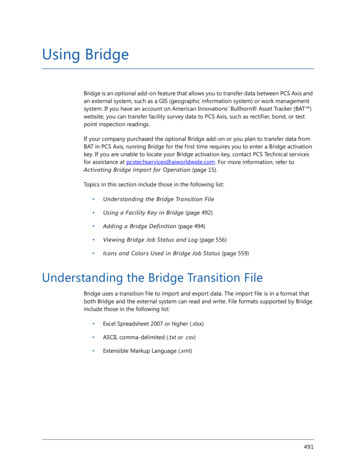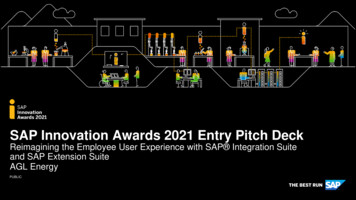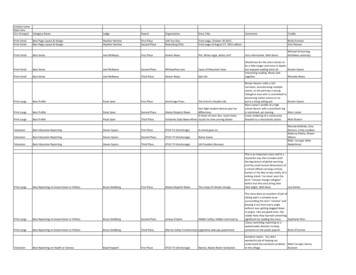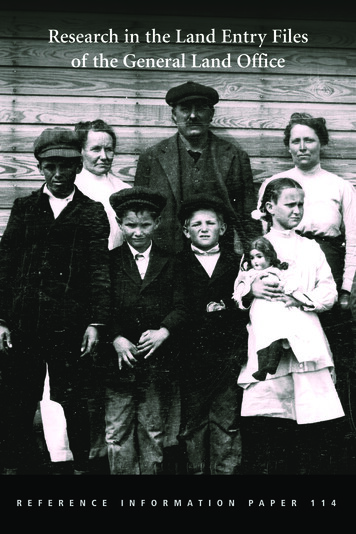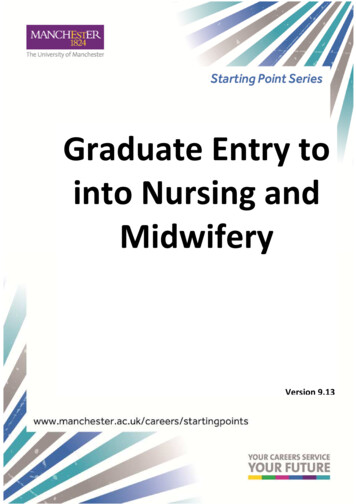
Transcription
Graduate Entry tointo Nursing andMidwiferyVersion 9.13
ContextRecruitment for many health professionals has been going through considerable upheaval in recentyears and for the first time graduates/diplomates have been leaving courses and reporting it difficultto find a job. However, the situation has started to improve and long term forecasting is verypositive for health professionals, with a consensus that recent short term problems were as a resultof issues to do with workforce planning as well as many trusts moving to Foundation status.Given the renewed government focus on nursing careers, the prescribing powers for nurses and thefact that hospitals will look to specialise, the forecast for the nursing job market is good. Areas suchas health visiting, school nursing, first contact nursing, walk-in centres, telephone triage and nursepractitioner roles are likely to be growth areas.The short term may prove challenging for some midwives but with government policy still aiming foran expansion of maternity services and more providers entering the market, there should be, in themedium to long term, a greater variety of midwife posts available with exciting career prospects.Detailed information about all careers in the health sector is available via www.prospects.ac.uk/health social care sector.htmwww.prospects.ac.uk/types of jobs wiferyMethods of trainingIf you are interested in entering the nursing profession, the first decision that you need to make iswhich branch of nursing to follow – adult, mental health, learning disability or child. For furtherinformation on each area of nursing, refer to the publications and websites listed at the end of thishandout. Adult branch nursing offers the most general training and at the present time it is possibleafter completing this to undertake further training via a shortened course, to gain secondregistration in another branch. However – with the present financial situation within the NHS thereare restrictions on the training available.There are a variety of alternative training routes for nursing, depending upon the degree subjectthat you have studied and the area of nursing you wish to enter. For graduates with a relevantdegree e.g. Psychology, Sociology, Biological Sciences there are a number of accelerated two yearpostgraduate courses. Some universities are becoming more flexible in their interpretation of whatconstitutes a ‘relevant’ degree. For example, a music graduate may go directly onto postgraduateprogramme, based on demonstrating that through the performance element of a music degree it isnecessary to receive criticism, reflect on performance and develop practice - all very similar to thestyle of learning in a clinical setting.The courses on offer can change from year to year. Some courses recruit through UCAS, some recruitthrough direct application via their website. You should refer to the Course Finderwww.nhscareers.nhs.uk/courses/?area 49998&qualification 51623&hours &uni ®ion &DoSearch Find courses section of the NHS Careers website for updated information and the UCAS website(www.UCAS.com) for lists of approved Nursing and Midwifery Council courses.
For those graduates with a non-relevant degree, currently the choice is to take a 3 - 4 year degreecourse.Universities currently offering two-year accelerated entry into nursing courses for graduates include(Note some courses are 2.5 to 3 years specifically for graduates): Buckingham New UniversityCity University (2.5 years) University of Essex Hatfield, University of Hertfordshire University of Hull King’s College London (University of London) Kingston University, London Middlesex University, London London South Bank University (3 years) University of Greenwich, London Napier University, Edinburgh (2.5 years) Northumbria University, Newcastle The University of Nottingham Robert Gordon University - Aberdeen University of Salford (3 years) Sheffield Hallam University The University of Sheffield University of Southampton University of West London University of West of ScotlandA degree in midwifery is essential for entry to the profession. The three or four-year degreeprogramme is open to graduates and diplomates from all degree and HND courses, but life sciencesmay be preferred. Registered nurses can do a 12-18 month shortened course. There are noaccelerated graduate courses in midwifery for graduates in other disciplines.You should refer to the Course Finder section of the NHS Careers website for updated informationwww.nhscareers.nhs.uk/courses/?area 49998&qualification 51623&hours &uni ®ion &DoSearch Find courses and the UCAS website (www.ucas.com) for lists of approved courses.
Issues around career progressionOpportunities to work abroad are manifold although individuals interested in this should do theirhomework as some countries do not recognise all of the branches of nursing. For example the adultbranch tends to be the favoured one for working in the US. The RCN and RCM can give you detailedadvice about working abroad.Nursing and midwifery are undergoing considerable change and the general view held is that thesehealth professionals will work in many different environments not just the NHS. Responsibility levelsare also increasing for nurses and midwives.For more information about the current job market and possible career progression in nursing andmidwifery see the NHS website www.whatcanidowithmydegree.nhs.ukEntry requirementsThe minimum requirements for degree programmes are usually five GCSEs at grade C or above(typically including English, maths and a science) and two or three A-levels/Highers (or equivalent),typically including a science/health-related subject. Check with individual institutions directly.For the shortened/accelerated postgraduate courses, candidates should ideally possess a healthrelated or social sciences degree. If this has been gained outside the UK it must be recognised as ofequivalent standing.In addition to academic qualifications, it is important that applicants can demonstrate a variety ofskills and personal qualities including empathy, flexibility, emotional resilience, goodcommunications skills, organisational ability and teamwork. Although pre-entry experience is notessential, any work, or voluntary work that has been undertaken in a caring setting, ideally with therelevant client group, will strengthen your application. It is a good idea to visit hospitals and talk tonurses and midwives directly about their roles.There are numerous opportunities for volunteering in a health sector environment. You can browseopportunities on the volunteering pages of the University website. These are all with organisationsthat have been checked out by the Volunteering and Community Engagement Team:www.manchester.ac.uk/careers/volunteeringMany hospitals have their own volunteering programme and examples of charities where you couldgain good experience are St John’s Ambulance, WRVS, Alzheimer’s Society, MIND, The NationalChildbirth Trust and the Stroke Association. Getting experience will also help you work out if this isthe kind of career you would like.Acceptance on a course will be subject to satisfactory health clearance and criminal disclosurechecks. Some medical conditions may exclude entry.The application procedureApplications for undergraduate honours degrees in nursing and midwifery in England, Wales,Scotland or the University of Ulster are made through the www.ucas.com. Some shortenedpostgraduate degrees have direct entry via the Institution’s website. Check out the Course Findersection of the NHS Careers website for updated information about all accelerated post graduatenursing degrees
(www.nhscareers.nhs.uk/courses/?area 49998&qualification 51623&hours &uni ®ion &DoSearch Find courses) For post graduate diploma and certain degree courses in Scotland, contactwww.nes.scot.nhs.uk. In Northern Ireland, Queens University requires direct application to thedegree. Timing of application may vary from course to course as some courses start in January.However, the general closing dates for courses via UCAS is the 15th January.Selection processAll short-listed applicants for nursing or midwifery will be invited to interview and the offer of aplace is dependent upon how well the candidate can convey their suitability for nursing / midwifery.Questioning in the selection interview is likely to focus upon the relevance of the skills andexperience gained through undergraduate study and work experience and of particular interest willbe analytical ability and critical thinking.FundingNursing and midwifery courses are funded by the NHS. Students on the accelerated postgraduateprogramme have their tuition fees paid and receive a non-means-tested grant of 1000. Studentsreceiving non-means-tested bursaries are not usually eligible for student loans, however it is worthchecking with Student Finance England http://www.sfengland.slc.co.ukfor your individual circumstances. Students on degree courses have their tuition fee contributionpaid for them by the NHS and receive a means-tested bursary to help towards living costs. Studentsin receipt of a means-tested bursary are usually eligible for student loans. To work out how muchyou are eligible for, use the Student Bursary Calculator (www.nhsbsa.nhs.uk/3576.aspx) tool orcontact the relevant funding body in your area if living outside of England. For further informationon finance, see www.nhsbsa.nhs.uk/students and also speak to course providers.Websites and useful resources Information on NHS bursaries for nursing and midwifery students in Englandwww.nhsbsa.nhs.uk/studentsNHS Wales Student Awards 92 Student Awards Agency for Scotlandhttp://www.saas.gov.uk/ Student Finance Northern ge? pageid 54,1265897& dad portal& schema PORTAL Royal College of Midwiveswww.rcm.org.ukRoyal College of Nursingwww.rcn.org.ukUCASwww.ucas.comNursing and Midwifery Council
www.nmc-uk.org What can I do with my degree?www.whatcanidowithmydegree.nhs.ukNHS jobswww.jobs.nhs.ukWork experience – via NHS Careers ce line – Health Learning and Skills Advice line – call 08000 150 850 or look atwww.skillsforhealth.org.ukDepartment of health – keep up to date with changes in the of-healthCareers Service CareersLink - For health care assistant vacancies andvacancies from nursing ooks in the Careers Resource CentreInclude: Becoming a Midwife (Routledge)Careers & jobs in Nursing (Kogan Page)Nurses & Midwives job seekers guide (The University of Liverpool)www.manchester.ac.uk/careers/library
as health visiting, school nursing, first contact nursing, walk-in centres, telephone triage and nurse practitioner roles are likely to be growth areas. The short term may prove challenging for some midwives but with government policy still aiming for an expansion of maternity services and more providers entering the market, there should be, in the medium to long term, a greater variety of .


